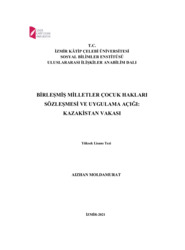Birleşmiş Milletler Çocuk Hakları Sözleşmesi ve uygulama açığı: Kazakistan vakası
-
Eser Sahibi
Moldamurat, Aizhan
- Tez Danışmanı Makbule Didem Buhari Gülmez
-
Tür
Yüksek Lisans
- Yayın Tarihi 2021
-
Yayıncı
İzmir Katip Çelebi Üniversitesi Sosyal Bilimler Enstitüsü
- Tek Biçim Adres https://hdl.handle.net/11469/2762
-
Konu Başlıkları
Çocuk hakları
Çocuk hakları - Kazakistan
Çocuklar - Hukuki durum, kanunlar, vb.
ÖZET1989 senesinde Birleşmiş Milletler, küresel çocuk haklarının korunmasında temel bir araç olan Çocuk Haklarına Dair Sözleşmesi'ni (BMÇHS) kabul etti. Benzersiz olarak, bu Sözleşme zamanında neredeyse evrensel onay alan tek sözleşme idi. Kazakistan, Sözleşmeyi imzalayan ve onaylayan eski Sovyet ülkeleri arasında ilk sırada yer aldı. Dolayısıyla, bu tez çalışması, Kazakistan’daki çocuk hakları sözleşmesinin ilk imzalama aşamasından uygulama aşamalarını değerlendirmeye odaklanmaktadır. Normların yayılımı (difuzyonu) yaklaşımı perspektifinden, Kazakistan'ın BMÇHS’ni imzalamada ve uygulamada normların yayılımının zorlama, rekabet, öğrenme ve öykünme mekanizmalarının olası etkisi değerlendirilmektedir. Çalışmanın temel amacı, Kazakistan vakası örneğinde ve BMÇHS çerçevesinde uluslararası normların yayılım ve uygulanma mekanizmalarını inceleyerek, Kazakistan'ın bu Sözleşmeyi imzalama ve onaylamadaki motivasyonlarını, amaçlarını ve maksatlarını anlamaktadır. Şu ana kadar, Kazakistan, çocuk hakları alanında normların yayılımı yaklaşımı ile çalışılmamış bir vakadır. Dolayısıyla, çalışma, gelişmekte olan ülkelerde normların yayılımı literatürüne katkıda bulunmayı amaçlamaktadır.ABSTRACTIn 1989, the United Nations adopted the Convention on the Rights of the Child (UNCRC), a fundamental instrument for the protection of global children's rights. the Convention was the only global document that received nearly universal ratification at that time. Kazakhstan was first among former Soviet countries to ratify the Convention. In this regard, the present thesis focuses on evaluating the initial signing stages of the Convention in Kazakhstan and its implementation phases that reflect certain implementation deficits. Through the prism of the norms diffusion approach, the mechanisms of the diffusion of norms such as coercion, competition, learning and emulation are evaluated in order to explain Kazakhstan's adoption and implementation of the UNCRC. The main objective of the thesis is to understand the possible motivations, aims and intentions of the Republic of Kazakhstan in signing and ratifying the UNCRC, through application of various norms diffusion mechanisms. As for today, the children's rights field in the Republic of Kazakhstan remains understudied from the perspective of norms diffusion theory. Accordingly, the last but not least aim of the study is to make contributions to the norms diffusion literature regarding post-Soviet developing countries.
-
Koleksiyonlar
ENSTİTÜLER
SOSYAL BİLİMLER ENSTİTÜSÜ

 Tam Metin
Tam Metin

